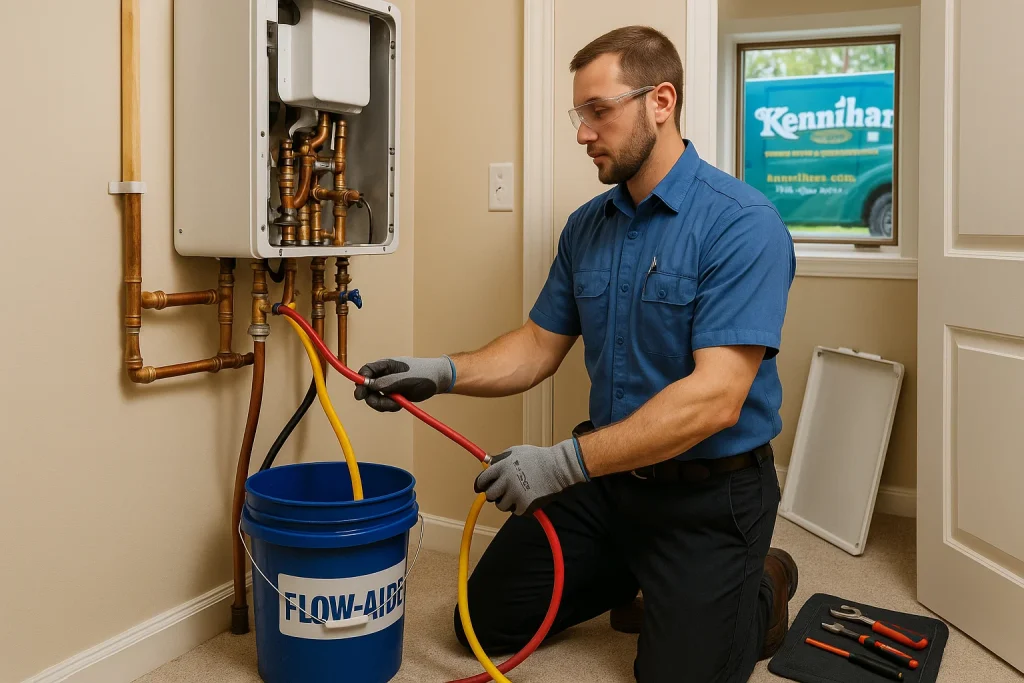Tankless water heaters, often referred to as on-demand water heaters, have gained popularity due to their energy efficiency, space-saving design, and virtually limitless hot water supply. These systems bring water into the unit only when there is demand, instantly heating cold water as it flows through the heat exchanger. As cold water enters the system, it is rapidly heated on demand, allowing the unit to produce hot water continuously for as long as needed. This means you can enjoy continuous use, such as taking a shower, without running out of hot water. Typically, these systems can provide hot water at a rate of 2–5 gallons per minute, depending on the model and water temperature.
There are different types of tankless water heaters, including electric, gas, condensing, and non condensing models. Electric tankless water heaters are typically used for point-of-use applications due to their lower flow rates, while condensing models offer higher efficiency compared to non condensing units by utilizing advanced technology to recover more heat. Gas-fired tankless water heaters, on the other hand, produce higher flow rates than electric ones, making them a better choice for households with higher hot water demands. When selecting a unit, consider the flow rate (measured in gallons per minute) to ensure it can supply enough hot water for multiple fixtures, like a shower, running at the same time.
Energy efficiency is a key benefit, and ENERGY STAR certified models help identify the most efficient options. The choice of fuel—gas, propane, or electric—impacts both efficiency and installation requirements. Proper installation is crucial: gas models require safe and code-compliant gas lines, and all units should be installed on a suitable wall (interior or exterior) by a licensed professional to ensure safety. Local climate also affects which system is best for your home, as it can influence performance and installation needs. For instance, gas tankless water heaters are generally preferred in colder climates due to their efficiency and superior heating performance.
To improve hot water delivery and reduce cold water waste in pipes, some systems include a recirculation pump. Regular maintenance is essential to prevent mineral buildup, especially in hard water areas, which helps maintain efficiency and prolongs the life of the unit. Most manufacturers recommend yearly descaling for tankless water heaters unless the water is very soft. While tankless water heaters generally last longer than traditional tanks, they will eventually need to be replaced, though replacement is less frequent. Upgrading and replacing an old water heater with a tankless model can improve efficiency and save space, but always prioritize safety by using a professional for installation and maintenance.
Let’s dispel that myth and explore why regular maintenance is essential to keeping your tankless water heater in Gibsonia running efficiently and reliably.

Introduction to Tankless Water Heaters
Tankless water heaters—sometimes called instant or on-demand water heaters—are designed to deliver endless hot water exactly when you need it, without relying on a bulky storage tank. Unlike traditional water heaters that keep a reservoir of hot water ready at all times, tankless heaters heat water only when a hot water faucet is turned on. This means you get instant hot water and continuous flow, while also reducing standby energy losses that can drive up energy costs.
Most tankless water heaters run on natural gas or electricity, making them a flexible choice for a variety of homes. Thanks to their energy efficiency, tankless models are especially popular among homeowners looking to save money on water heating and enjoy energy savings over the life of the unit. With the right model and proper installation, you can enjoy continuous hot water for showers, dishwashers, and even your clothes washer—no more worrying about running out during peak demand.
Before you purchase a tankless water heater, it’s important to consider your household’s hot water needs and request cost estimates from a licensed plumber. Be sure to check with your local Better Business Bureau to find a reputable contractor, and review any local permit requirements to ensure a smooth installation. By doing your homework and selecting the right tankless system for your home, you’ll benefit from energy savings, lower energy costs, and a longer-lasting water heating solution that keeps up with your family’s demand for hot water. Additionally, look for federal tax credits or local utility rebates when purchasing a tankless water heater in Pittsburgh to offset the initial cost.
The Maintenance-Free Myth
One of the most common misconceptions about tankless systems is that, unlike traditional tank water heaters, they don’t require routine maintenance. This myth stems from the absence of a storage tank that could accumulate sediment. While it’s true that tankless units don’t store water in the same way, they are still subject to mineral buildup—especially in areas with hard water.
In reality, all water heaters that interact with your home’s water supply are vulnerable to the effects of scale, corrosion, and sediment. Tankless systems use intricate heat exchangers and narrow piping that are particularly sensitive to calcium buildup. Over time, this can reduce efficiency, increase energy costs, and eventually lead to breakdowns.
What Happens Without Maintenance?
Neglecting your tankless water heater can result in:
- Mineral scale buildup: Hard water can lead to calcium deposits on the heat exchanger, significantly reducing efficiency and lifespan.
- Reduced water flow: Blockages from scale can restrict water flow, causing inconsistent heating or system shutdowns.
- Increased energy usage: The system must work harder to heat water through scale-covered components, leading to higher energy bills.
- Voided warranties: Most manufacturers require regular maintenance for the warranty to remain valid.
Essential Maintenance Tasks
Fortunately, maintaining a tankless water heater is relatively simple and pays off in the long run. Here’s what’s involved:
- Descaling or Flushing: This should be done at least once a year, or every six months in areas with hard water. It involves circulating a vinegar or descaling solution through the heater to remove mineral deposits from the heat exchanger.
- Cleaning the Inlet Filter: The inlet water filter prevents debris from entering the system and should be inspected and cleaned regularly.
- Checking the Venting System: If your tankless system uses gas, we need to make sure the air intake and exhaust are clean and unobstructed to ensure proper combustion and airflow.
- Inspecting the Burner and Ignition: These components should be checked for proper function and cleanliness during annual professional servicing.
Professional or DIY?
While some handy homeowners can handle basic flushing and filter cleaning themselves, it’s a good idea to schedule an annual professional inspection. Technicians can spot early signs of wear, test system performance, and ensure everything is up to code and running safely.
Tankless water heaters are efficient, reliable, and long-lasting—but only with proper care. The myth that they require no maintenance is not only false, but potentially damaging. Treat your tankless system to annual maintenance, and it will return the favor with years of uninterrupted hot water and savings on energy costs.
Don’t skip the upkeep—your tankless water heater depends on it. Schedule an appointment with the experts at Kennihan Plumbing & Heating, Inc. We treat your home like it’s our grandma’s home.

